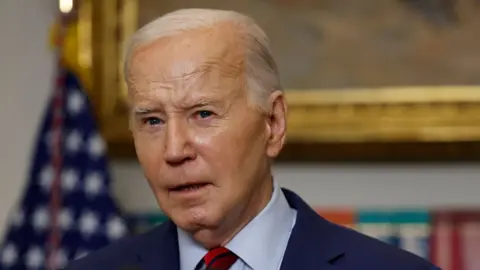Joe Biden calls US allies India and Japan 'xenophobic'

US President Joe Biden has called Japan and India "xenophobic", grouping them together with Russia and China as countries that "don't want immigrants".
His criticism of Japan comes just weeks after he called the US-Japan alliance "unbreakable" during a state visit from Prime Minister Fumio Kishida.
India is also a key US partner, despite US concerns about human rights and religious freedoms there.
The White House says that Mr Biden meant no offence to either country.
Speaking to a predominantly Asian-American audience at a campaign fundraising event on Wednesday evening, Mr Biden said that the US election this November was about "freedom, America and democracy".
"Why? Because we welcome immigrants," he added. "Think about it. Why is China stalling so badly economically? Why is Japan having trouble. Why is Russia? Why is India? Because they're xenophobic. They don't want immigrants."
The BBC contacted the US embassies of Japan, India, China and Russia for comment, but did not receive an immediate reply.
The comments, however, have drawn criticism from US commentators.
On X, formerly Twitter, Elbridge Colby, a former US deputy assistant secretary of defence in the Trump administration, wrote that Japan and India "are two of our very stoutest and important allies".
"We should speak to them with respect, which they command and deserve," he added. "Applying parochial progressive views to our allies is patronising and foolish."
Although Japan, India and China have relatively few foreign-born workers, Russia is heavily reliant on migrant labour, much of it drawn from Central Asia.
While economic growth has been sluggish in Japan and China, Russia's militarised economy rebounded slightly last year as its war with Ukraine continues, despite international sanctions.
India, meanwhile, has experienced steady growth and surpassed the UK in 2023 to become the world's fifth-largest economy.
The White House denied that Mr Biden's comments were meant in a derogatory sense, with national security spokesman John Kirby saying he was making a wider point on US immigration policy.
"Our allies and partners know well in tangible ways how President Biden values them, their friendship, their co-operation" Mr Kirby said. "They understand how much he completely and utterly values the idea of alliances and partnerships."
Sadanand Dhume, a South Asia expert at the Washington DC-based American Enterprise Institute, told the BBC that Mr Biden's comments would probably be received poorly in India as it experiences a "nationalist upsurge".
"It will confirm the idea among a section of Indians that Mr Biden is not friendly to India," he said. "They will not take kindly to having been clubbed along with authoritarian countries like China."
In late April, a US Department of State report found "significant" human rights abuses in India, which its government said "is deeply biased and reflects a very poor understanding of India."
In the longer term, however, Mr Dhume said that remarks are a "tempest in a teacup" and "unlikely to significantly affect US-Indian relations."
While Japan has for decades had some of the world's most restrictive immigration policies, it has recently sought to address a steadily shrinking population by facilitating the entry of foreign workers.
Mr Biden, who repeatedly characterised former US President Donald Trump as xenophobic during his 2020 campaign, has taken an increasingly restrictive approach to immigration amid widespread anger - from both sides of the political spectrum - over his handling of the US-Mexico border.
